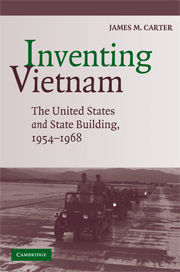Inventing Vietnam
This book considers the Vietnam war in light of U.S. foreign policy in Vietnam, concluding that the war was a direct result of failed state-building efforts. This U.S. nation building project began in the mid-1950s with the ambitious goal of creating a new independent, democratic, modern state below the 17th parallel. No one involved imagined this effort would lead to a major and devastating war in less than a decade. Carter analyzes how the United States ended up fighting a large-scale war that wrecked the countryside, generated a flood of refugees, and brought about catastrophic economic distortions, results which actually further undermined the larger U.S. goal of building a viable state. Carter argues that, well before the Tet Offensive shocked the viewing public in late January, 1968, the campaign in southern Vietnam had completely failed and furthermore, the program contained the seeds of its own failure from the outset.
- Clear and readable history of the period
- Presents a novel interpretation of the causes of the Vietnam war
- Incorporates a nuanced understanding of US foreign policy and in-depth coverage of the war
Reviews & endorsements
'… his work adds an important piece of understanding to the extremely complex jigsaw which was Vietnam at the time.' Asian Affairs
Product details
June 2008Paperback
9780521716901
276 pages
229 × 152 × 16 mm
0.38kg
15 b/w illus.
Available
Table of Contents
- 1. Introduction
- 2. The Cold War, colonialism, and the origins of the American commitment to Vietnam, 1945–1954
- 3. 'The needs are enormous, the time short': Michigan State University, the United States operations mission, nation building, and Vietnam
- 4. Surviving the crises: Southern Vietnam, 1958–1960
- 5. 'A permanent mendicant': Southern Vietnam, 1960–1963
- 6. A period of shakedown: Southern Vietnam, 1963–1965
- The paradox of construction and destruction: Southern Vietnam 1966–1968
- 8. Epilogue: war, politics, and the end in Vietnam.










